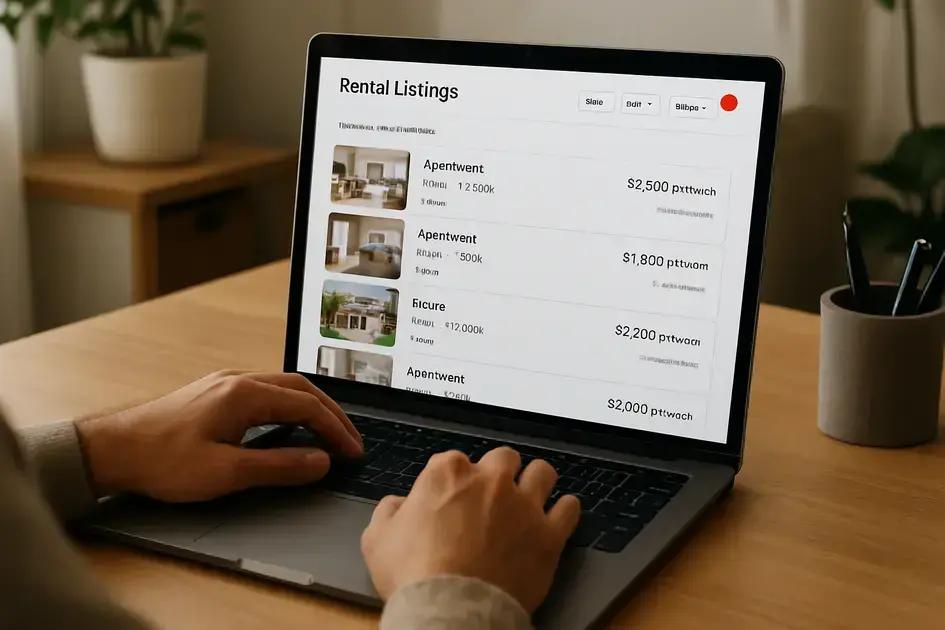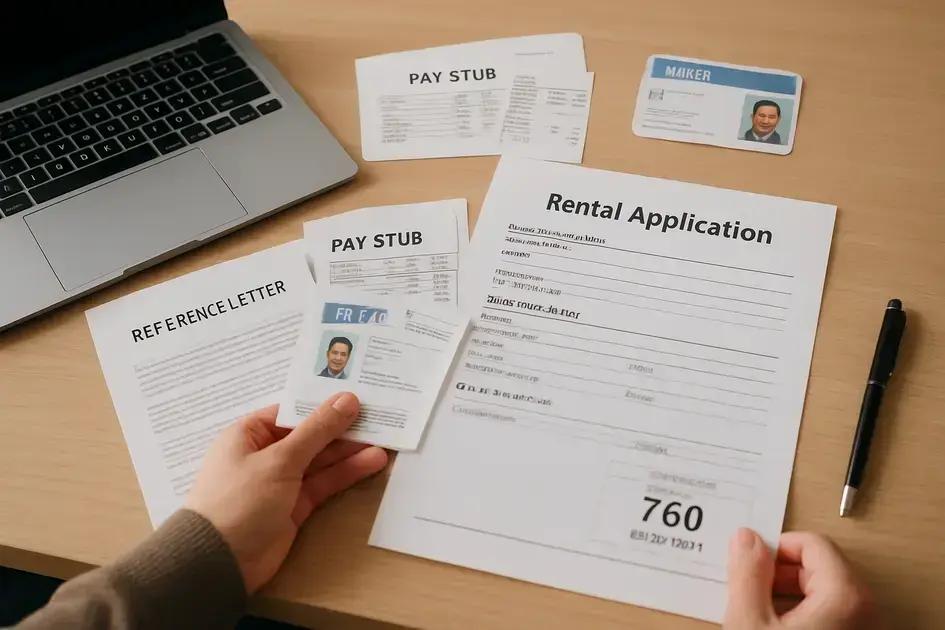Rent a house effectively by understanding market basics, setting a realistic budget, choosing the right location, reviewing lease terms carefully, preparing all documents, and communicating clearly with landlords to avoid common pitfalls and resolve issues quickly.
Rent a house can be exciting but also tricky if you don’t know where to start. Ever wondered how to avoid common pitfalls and spot a deal that really fits your needs? Let’s dive into practical tips that make the search less stressful and more rewarding.
understanding the rental market basics
The rental market can seem complex at first, but understanding its basics will help you navigate it with confidence. Rental properties vary widely in price, type, and location depending on supply and demand in the area. Knowing key factors like average rent rates, lease terms, and tenant rights gives you a solid foundation. Typically, the market moves based on seasonal trends and economic conditions, so staying informed helps you spot good opportunities.
Types of rental properties
Rental options include apartments, single-family houses, condos, and townhomes. Each comes with different costs and amenities. For example, apartments often offer shared facilities like gyms, while houses provide more privacy and outdoor space.
Market dynamics to watch
Be aware of vacancy rates, rent increases, and new developments. High vacancy might mean landlords are willing to negotiate, whereas low vacancy usually drives prices up. Understanding market trends helps you decide when and where to rent.
Legal basics for renters
Familiarize yourself with rental laws in your area, such as security deposit limits, required disclosures, and eviction processes. Knowing your rights protects you from unfair practices and ensures a smoother renting experience.
By grasping these fundamental concepts of the rental market, you’ll be better equipped to find a home that fits both your needs and budget without unnecessary stress.
how to define your budget realistically
Setting a rental budget is crucial to finding a home you can afford without financial stress. Begin by evaluating your monthly income and calculate what percentage can comfortably go towards rent. Financial experts often recommend allocating no more than 30% of your income to housing costs. Remember to include other expenses like utilities, transportation, and groceries when planning your budget.
Consider all costs beyond rent
Rent isn’t the only monthly expense. Be sure to factor in security deposits, renter’s insurance, and potential maintenance fees. These additional costs can significantly impact your overall budget, so include them in your calculations.
Use budgeting tools and apps
Track your expenses using budgeting apps or spreadsheets to get a clear picture of your finances. This helps you avoid overextending and ensures you select a rental price that fits your financial situation.
Plan for savings and emergencies
Set aside funds for unexpected costs or emergencies. Maintaining a financial cushion allows you to handle unforeseen changes, such as temporary income loss or urgent repairs, without jeopardizing your housing.
By defining your budget realistically and considering all related expenses, you can confidently search for a rental property that suits your lifestyle and financial goals.
choosing the right location for your lifestyle

Choosing the right location is one of the most important decisions when you decide to rent a house. Your location affects your daily routine, commute time, safety, and overall happiness. Begin by considering what matters most to your lifestyle, such as proximity to work, schools, or public transportation.
Assess neighborhood amenities
Think about nearby amenities like grocery stores, parks, gyms, and restaurants. A convenient neighborhood can make daily life easier and more enjoyable. Access to quality schools and healthcare might be essential if you have a family.
Evaluate safety and community
Research crime rates and talk to locals to understand the community vibe. Feeling safe and welcomed in your neighborhood contributes greatly to your comfort and wellbeing.
Consider future developments
Look into planned developments or changes in the area that may impact property values or quality of life. Sometimes upcoming projects can improve the neighborhood, but other times they might bring noise or traffic.
Keep in mind how the location fits your hobbies and social life. If you enjoy the outdoors, living near parks or trails adds value. For those who love nightlife, being close to entertainment options is key.
what to check before signing a rental contract
Before signing a rental contract, it’s essential to carefully review every detail to protect your rights and avoid surprises. Start by reading the lease terms thoroughly, including the length of the rental, monthly rent, and payment due dates. Look for any hidden fees or penalties that may apply for late payments or breaking the lease early.
Understand your responsibilities
Know what maintenance tasks you are responsible for and what the landlord will cover. This includes repairs, lawn care, and utilities. Clear understanding prevents disputes later.
Check clauses about deposits and refunds
Verify the security deposit amount and conditions for its return. Be aware of any damages or cleaning fees that could be deducted. Make sure these terms are clearly stated to avoid conflicts when moving out.
Inspect rules on subletting and guests
Some contracts restrict subletting or limit the duration guests can stay. Confirm these policies to ensure they align with your plans.
Look for terms on lease renewal and termination
Understand how and when you can renew or terminate the lease. Knowing notice periods and penalties helps you plan ahead.
Carefully reviewing these points and asking questions if anything is unclear gives you confidence that the rental agreement is fair and suits your needs.
negotiation tips to lower your rent
Negotiating rent can seem intimidating, but it is often possible to secure a better deal with the right approach. Start by researching comparable rental prices in the area to understand the market rate. Having this data gives you leverage when discussing rent with the landlord.
Build a good relationship with the landlord
Being polite and professional can make a positive impression. Landlords are more likely to negotiate with tenants they find trustworthy and responsible.
Offer to sign a longer lease
Landlords appreciate stability. Offering to sign a lease for a year or more can encourage them to lower the monthly rent in exchange for long-term commitment.
Highlight your strengths as a tenant
Point out your reliable income, good credit score, and history of on-time payments. These factors reduce risk for the landlord, making them more open to discounts.
Consider timing your negotiation
Try negotiating before the lease starts or during off-peak rental seasons when demand is lower. This increases your chances of a concession.
Finally, don’t be afraid to propose a reasonable counteroffer and be prepared to compromise. Even a small reduction can make a big difference in your monthly budget.
using online platforms effectively

Online platforms have become essential tools for renting a house. They allow you to browse a wide range of listings, filter options based on your preferences, and connect directly with landlords or agents. Using these platforms effectively saves time and helps you find the best deals.
Set up clear search filters
Customize your search by price, location, property type, number of bedrooms, and amenities. This narrows down options to homes that truly match your needs.
Check reviews and ratings
Many platforms include reviews from previous tenants. Reading feedback can provide insight into the property condition and the responsiveness of the landlord.
Use alert features
Set up email or app notifications to be informed immediately when new listings match your criteria. This helps you act quickly in competitive markets.
Verify listings carefully
Be cautious of scams by confirming the legitimacy of listings. Look for professional photos, detailed descriptions, and trusted user profiles.
By mastering these online tools, you increase your chances of finding a rental home that fits your lifestyle and budget without unnecessary hassle.
the role of a real estate agent in renting
A real estate agent can be a valuable ally when renting a house. They have access to a wide range of listings, including some not publicly advertised, helping you find options that fit your needs quickly. Agents handle the paperwork and can explain complex lease terms, making the process smoother.
Expert market knowledge
Agents understand local rental market trends, pricing, and neighborhood pros and cons. Their insights help you make informed decisions about where to rent and how much to offer.
Negotiation support
Real estate agents can negotiate on your behalf to get better rental terms or price reductions. Their experience often leads to more favorable agreements for tenants.
Saves time and effort
By managing property tours, screening landlords, and organizing documents, agents save you valuable time and reduce stress during your search.
Guidance on legal aspects
Agents can help you understand rental laws and your rights, ensuring the lease complies with regulations and protects your interests.
While working with an agent might involve a fee, their expertise can be worth it by making your rental journey faster and more secure.
common pitfalls to avoid when renting a house
Renting a house comes with its challenges, and avoiding common pitfalls can save you time, money, and stress. One frequent mistake is not thoroughly inspecting the property before signing the lease. Always check for damages, plumbing issues, and appliances to avoid unexpected repair costs.
Ignoring the lease agreement details
Many renters skim through contracts without understanding key clauses. Pay close attention to terms about rent increases, maintenance responsibilities, and penalties for breaking the lease.
Failing to document the property condition
Take photos and notes of the home’s condition on move-in day. This documentation protects you from unfair claims when you move out.
Overlooking neighborhood research
Not verifying the safety or convenience of the neighborhood can lead to dissatisfaction. Visit the area at different times and talk to neighbors if possible.
Ignoring your budget limits
Renting beyond your financial means can cause long-term difficulties. Stick to a realistic budget considering all housing-related expenses.
Being aware of these pitfalls and taking simple precautions helps ensure a smoother and more positive renting experience.
how to prepare documents for a smooth rental process

Preparing your documents ahead of time can make the rental process quicker and less stressful. Commonly requested documents include proof of income, identification, rental history, and references. Having these ready shows landlords that you are a serious and organized applicant.
Proof of income
Provide recent pay stubs, tax returns, or a letter from your employer to demonstrate your ability to pay rent on time.
Identification
A valid government-issued ID, such as a driver’s license or passport, is necessary to confirm your identity.
Rental history and references
Landlords often request contact details for previous landlords or property managers to verify your rental behavior. Positive references can strengthen your application.
Credit report
Some landlords ask for a credit report to assess your financial reliability. You can obtain a free copy from credit bureaus and provide it proactively.
Organizing these documents in advance helps you respond quickly to rental inquiries and increases your chances of securing your desired home.
what to do if problems arise during your lease
Problems can arise during a lease, but knowing how to handle them can protect your rights and maintain a good rental experience. If issues occur, start by documenting the problem with photos and written details. This evidence is essential if disputes escalate.
Communicate promptly with your landlord
Report maintenance issues or disagreements in writing. Clear communication helps resolve problems quickly and keeps a record of requests.
Understand your lease terms and rights
Review your contract and local tenant laws to know your responsibilities and protections. This knowledge empowers you in discussions or negotiations.
Seek mediation or legal advice if needed
If direct communication fails, consider mediation services or consult a tenant rights organization. Legal advice can clarify options and next steps.
Keep records of all interactions
Save emails, texts, and documents related to the issue. Organized records support your case if legal action becomes necessary.
Taking these steps calmly and systematically can help you manage lease problems effectively and protect your housing stability.
Key takeaways for a smooth rental experience
Renting a house can be simple and stress-free when you know what to expect and how to prepare. From understanding rental market basics to handling problems during your lease, each step matters.
Being organized with your documents, choosing the right location, and communicating clearly with your landlord help create a positive rental journey. Remember, knowing your rights and planning ahead can save you from common pitfalls and challenges.
Taking these practical steps will empower you to find a home that fits your needs and budget, making renting a rewarding experience.
FAQ – Common questions about renting a house
What documents do I need to rent a house?
You will typically need proof of income, valid identification, rental history, references, and sometimes a credit report.
How can I negotiate a lower rent?
Research local rental prices, build a good relationship with the landlord, offer to sign a longer lease, highlight your strengths as a tenant, and choose the right timing.
What should I check before signing a rental contract?
Read the lease thoroughly, check for hidden fees, understand your responsibilities, review deposit terms, and know rules about subletting and lease termination.
How do I avoid common pitfalls when renting?
Inspect the property carefully, understand the lease terms in detail, document the property’s condition, research the neighborhood, and stick to your budget.
How can a real estate agent help me rent a house?
Agents provide market knowledge, access to listings, handle paperwork, negotiate on your behalf, and guide you through legal aspects.
What should I do if problems arise during my lease?
Document the issues, communicate promptly with your landlord, understand your lease and tenant rights, keep records of all interactions, and seek mediation or legal advice if needed.
